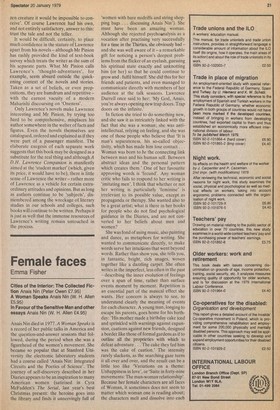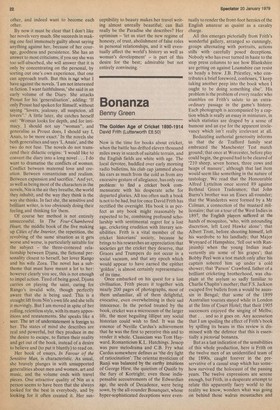Female faces
Emma Fisher Cities of the interior: The Collected Action Anais Nin (Peter Owen £7.95) A Woman Speaks Anais Nin (W. H. Allen £5.95) In Favour of the Sensitive Man and other essays Anais Mn (W. H. Allen £4.95) Anais Nin died in 1977.A Woman Speaks is a record of her public talks in America and the question-and-answer sessions that followed, during the period when she was a figurehead of the women's movement. She became so popular that at Stanford University the electronic laboratory students had a course called `Anais Nin: Integrated Circuits and the Poetics of Science'. The • journey of self-discovery described in her Diaries appears to be an inspiration to many American women (satirised in Cyra McFadden's The Serial, last year's best Christmas present: the heroine goes into the library and finds it unnervingly full of 'women with bare midriffs and string shopping bags . . . discussing Anais Ni'). She must have been an amazing woman. Although she rejected psychoanalysis as a vocation after practising very successfully for a time in the Thirties, she obviously had — and she was well aware of it — a remarkable gift for noticing a person's deepest problems from the flicker of an eyelash, guessing his spiritual state exactly and unknotting him (or her) so that he could continue to grow and . fulfil himself. She did this for her friends and patients, and even managed to communicate directly with members of her audience at the talk sessions. Lawrence Durrell once said to her: 'My God, Anais, you're always opening new trap doors. Trap doors on the infinite.'
In fiction she tried to do something new, and she saw it as intricately linked with the fact that she was a woman; she was antiintellectual, relying on feeling, and she was one of those people who believe that 'It is man's separateness, his so-called objectivity, which has made him lose contact . . . Woman was born to be the connecting link between man and his human self. Between abstract ideas and the personal pattern which creates them.' One of her favourite approving words is 'fecund'. Any woman critic who fails to respond to her writing is 'imitating men'. I think that whether or not her writing is particularly 'feminine' is irrelevant to its possible value, except as propaganda or therapy. She wanted also to be a great artist; what is there in her books for people who do not find psychological guidance in the Diaries, and are not converted to her beliefs about men and women?
She was fond of using music, also painting and dance, as metaphors for writing. She wanted to communicate directly, to make words serve her intuitions that went beyond words. Rather than show you, she tells you, in fantastic, bright, rich images, woven together like a dazzling carpet. She often writes in the imperfect, less often in the past — describing the inner evolution of feelings over a span of time, rather than surface events moment by moment. Repetition is an essential part of the musical effect she wants. Her concern is always to see, to understand clearly the meaning of events for each character. A young man, longing to escape his parents, goes home for his birthday: 'His mother made a birthday cake iced and sprinkled with warnings against expansion, cautions against new friends, designed a border like those of formal gardens as if to outline all the proprieties with which to defeat adventure. . . The cake they fed him was the cake of caution.' The intensity rarely slackens, as the searching gaze turns it all over and over, and the result can be a little too like 'Variations on a theme: Unhappiness in love', or 'Suite in forty-nine movements: The man-woman relationship'. Because her female characters are all faces of Woman, it sometimes does not seem to matter which woman one is reading about; the characters melt and dissolve into each other, and indeed want to become each other.
By now it must be clear that I don't like her novels very much. She succeeds in making one feel immensely guilty about saying anything against her, because of her courage, goodness and persistence. She has an answer to most criticisms; if you say she was too self-absorbed, she will answer that it is only by concentrating on the personal, by sorting out one's own experience, that one can approach truth. But this is 11Qt what I have against the novels. 'I am not interested in fiction. I want faithfulness,' she said in an early volume of the Diary. She attacks Proust for his 'generalisation', adding: 'If only Proust had spoken for himself, without saying "lovers, jealousy, all suspicion, all lovers".' A little later, she catches herself out: 'Woman looks for depth, and for intimacy. I should not say "woman", and generalise as Proust does, I should say I, Anais, to be more exact.' In the novels she both generalises and says 'I, Anais', and the two do not fuse. The novels do not transcend their didactic origins: 'I would like to convert the diary into a long novel. . . I do want to dramatise the conflicts of woman. Conflict between maternal love and creation. Between romanticism and realism. Between expansion and sacrifice.' And yet, as well as being most of the characters in the novels, Nin is the air they breathe, the world they inhabit, and the way they think is the way she thinks. In fact she, the sensitive and brilliant writer, is too obviously doing their feeling, and thinking for them.
Of course her method is not entirely unsuccessful. In The Four-Chambered Heart, the middle book of the five making up Cities of the Interior, the repetition, the revolving of the same situation as it gets worse and worse, is particularly suitable for the subject — the three-cornered relationship between Djuna, the fictional personality closest to herself, her lover Rango and his wife Zora. The novel has a subtheme that must have meant a lot to her: however clearly you see, this is not enough to impel action. Tired of being good,I3juna carries on playing the saint, caring for Rango's invalid wife, though perfectly aware that she is being used. This is a straight lift from Nin's own life and she tells it movingly. But I am moved in spite of her rolling, relentless style, with its many appositions and restatements. She speaks like a seer. The art of understatement is foreign to her. The states of mind she describes are real and powerful, but they produce in me the desire to escape, to flatten their reality and get out of the book, instead of a desire to believe and (to put it bluntly) to read on.
Her book of essays, In Favour of the Sensitive Man, is characteristic. As usual, she bravely plunges in with unsupported generalities about men and women, art and music, and the volume ends with travel pieces. One attractive quality of Nin as a person seems to have been that she always looked for the best in everybody, and by looking for it often created it. Her sus ceptibility to beauty makes her travel writing almost unreally beautiful; can Bali really be the Paradise she describes? Her optimism — let us start the new regime of honesty, of trust, abolishment of false roles in personal relationships, and it will eventually affect the world's history as well as woman's development' — is part of this desire for the best; admirable but not entirely convincing.



































 Previous page
Previous page